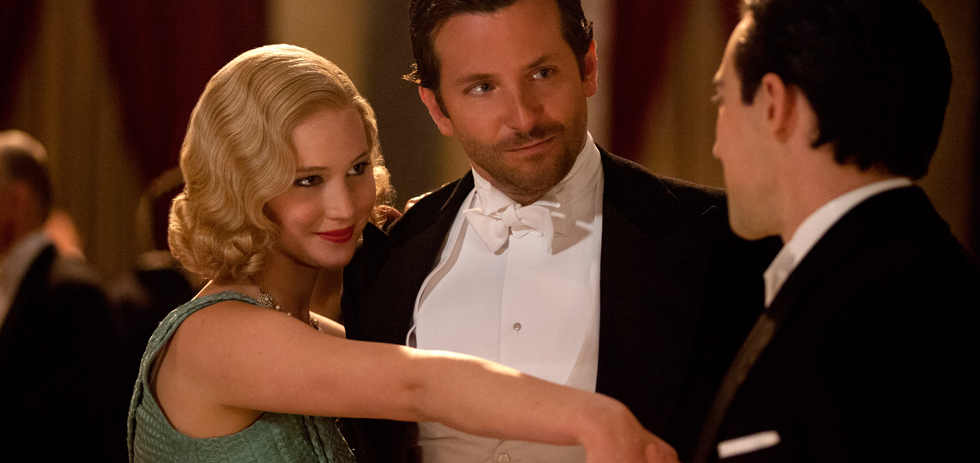
Not even ten minutes go by in Serena before it becomes evident why it was kept on a shelf so long that it debuted at this year’s Toronto International Film Festival opposite the next feature film made by its director, Susanne Bier. It also explains why it is being dumped so unceremoniously in the same Australian cinema week as another, much more noteworthy Jennifer Lawrence movie. The opening is deadeningly sterile, with interminable music cues and master shots standing in for the succinct curios boasted by better period dramas before. Not content with being boring, though, it proceeds onward into a sadly misjudged romance drama that inspires laughter more than sympathy, though not even in a way that would at least endow it with a spot in the halls of ironic disaster-pieces.
In 1929, George Pemberton (Bradley Cooper) is the head of a North Carolina timber company that has national legislators nipping at its heels in the wake of the Wall Street Crash. His men perform treacherous labour under the watchful eye of Galloway (Rhys Ifans), and the mounting casualties put him on the wrong side of his loaners and of the local sheriff (Toby Jones). Soon, his pastime of hunting wildlife with business partner Buchanan (David Dencik) just can’t sufficiently soothe his manhood, so he dashes off to the city and lands a beau in Serena (Jennifer Lawrence), who takes up an intimate partnership with him both at the business and in the bedroom (as the comically frequent sex scenes make abundantly clear). Soon, the changes brought on by their spontaneous marriage erupt into something worse than anticipated, and when the prospect of fatherhood rears its head through a former flame (Ana Ularu), the fallouts of his private and professional lives begin to merge irrepressibly.
This gradual downscaling of the story’s focus from period trappings to personal affairs is the film’s most novel quality. Assuming Bier had a decent say in the editing process – and who knows, given the protracted timeline of the production – it seems she’s most interested in that too. The editing skips through the state of Pemberton’s empire and then his budding affair with Serena via the spotty perspective of someone nodding off to sleep, complete with fades to black that feel like drooping eyelids. Unfortunately this half-heartedness is never corrected, and so it criminally wastes some serene moments both in the cinematography and in the cast’s performances through unintentionally humorous juxtaposition.
And it is a real shame, because the actors and cinematographer aren’t phoning anything in. From the first frame on, Morten Søborg (In A Better World, Valhalla Rising) does interesting work with the finely-crafted setting he is given, washing the Smoky Mountains in muddy hues that give it a decent sense of visual character. As for the cast, Lawrence is initially adaptable and has a curious take on the psychosis of her role, but she’s so undercut by the thuddingly plain dialogue and errant plot trajectory that her tics feel out of place by the conclusion. Cooper’s knack for his emasculated power figure (not to mention his pleasing Southern cadence) is similarly snuffed out, as are the dependable supporting cast littered with notable character actors.1
It’s the plotting that kills the mood strongest, with nonsensical developments dropping like anvils to create uncompelling situations. Ifans gets the worst of these, turning from an aloof stranger into what is essentially Oddjob to Serena’s Goldfinger for unfathomably silly reasons. Worse are those who aren’t given any reasons for their actions at all, since Ularu’s character goes totally unscrutinised until an absurdly-staged climax aboard a moving train that demands we care about her well-being, and not the woman after the whom the movie is named. You could argue this is because George Pemberton, the fulcrum of Serena’s self-determined destiny, is the focus instead, and yet attempts at establishing and dressing down his masculinity are both cluttered and unsubtle. The film starts with a scene of him cocking his rifle at wandering animals, and ends with an uproarious callback that shoots for transcendent symbolism and dispenses with all empathy in the process, largely thanks to the worst instance of a CGI-constructed animal since Snowpiercer.
It’s hard to say what meagre life Serena could come across in the future. Maybe the fact that Darren Aronofsky and Angelina Jolie were once attached means its turbulent production history will have anecdotal charm. Perhaps J-Law enthusiasts will find a GIF-able shot or two to share on Tumblr. Certainly it’s too awkward and dreary to be an entertaining kind of cult hit, despite the aforementioned bonkers ending. Some movies just have to sink, particularly this far out from the Oscar deluge, and Serena feels like it’s doing so with a sad sense of inevitability.
